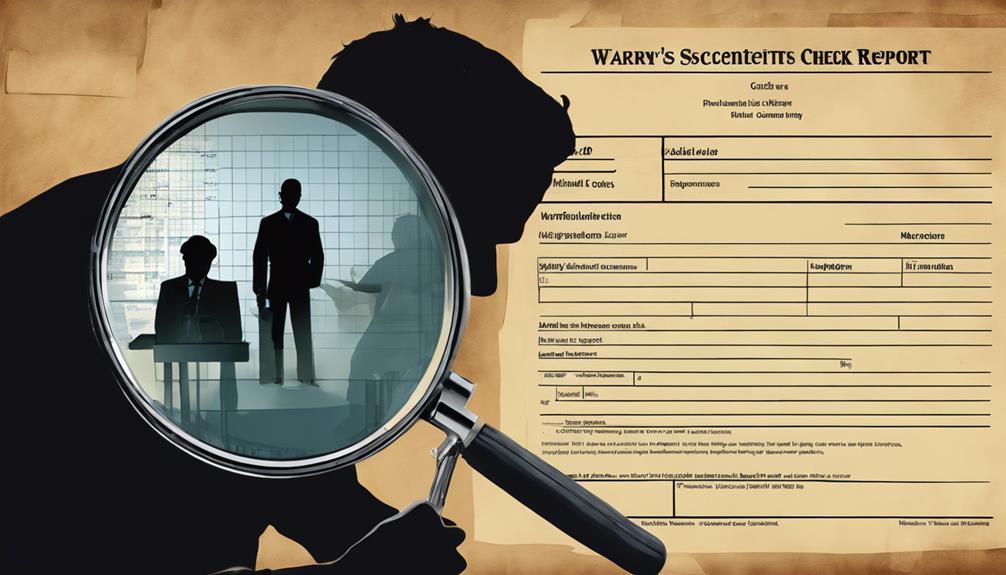Yes, ordinance violations can be included in background checks, affecting job and housing options. The severity of the violation and location play a role. Criminal history databases' completeness varies by state. Specifics differ across states, influencing employment and living situations. Resolving violations promptly is essential to mitigate consequences, seeking legal guidance for best outcomes. Unresolved violations could lead to legal issues affecting diverse areas of life. Understanding the nuances of this topic can help individuals navigate potential implications effectively.
Key Takeaways
- Inclusion depends on the background check type and severity of the violation.
- Jurisdiction and disclosure laws influence whether ordinance violations appear.
- Completeness of criminal history databases impacts visibility of violations.
- State laws vary, affecting the reporting and visibility of ordinance violations.
- Resolving violations promptly can mitigate their impact on background checks.
Ordinance Violations on Background Checks

When conducting background checks, the inclusion of ordinance violations depends on factors like severity, jurisdiction, and disclosure laws.
Ordinance violations are minor infractions that may or may not appear on criminal history information depending on the circumstances. Unlike more serious offenses like misdemeanors or felonies, ordinance violations are less likely to be included in background checks.
The presence of an ordinance violation in a background check is influenced by the type and severity of the violation, the jurisdiction where it occurred, and the specific disclosure laws governing the background check process.
The completeness of a background check can also vary based on the extent of records in different criminal history databases, affecting the visibility of ordinance violations.
Additionally, the specifics of what shows up on a background check, including ordinance violations, can differ between states due to varying laws and practices regulating background checks.
Factors Influencing Background Check Inclusions
Factors influencing the inclusion of ordinance violations on background checks vary depending on the type and severity of the violation, the jurisdiction where it occurred, and the specific disclosure laws governing the background check process.
The nature of the violation, whether it's a minor infraction or a more serious criminal offense, plays a significant role in determining its visibility on a background check. Additionally, the location where the violation took place can impact whether it's reported in background information. Different jurisdictions have varying rules regarding the disclosure of local ordinance violations, affecting their inclusion in background checks.
Moreover, the type of background check being conducted, such as a standard employment check or a detailed criminal record search, can also influence whether ordinance violations are revealed. While criminal violations like misdemeanors or felonies are typically more likely to appear on background checks, minor infractions or civil violations may not always be disclosed, depending on the specific disclosure laws in place.
These factors collectively shape the inclusion of ordinance violations in background checks, highlighting the complexity involved in evaluating someone's background accurately.
Influence of Violation Severity on Checks

The visibility of local ordinance violations on background checks is greatly influenced by the seriousness of the violation. When it comes to determining whether a violation will show up on a background check, the gravity of the offense plays a pivotal role.
Here's how the seriousness of a violation impacts its inclusion:
- Criminal Offenses: Serious violations like criminal offenses are more likely to be reported on background checks due to their gravity and potential impact on an individual's trustworthiness.
- Minor Infractions: On the other hand, minor infractions or civil violations may not always be disclosed in background checks as they're deemed less significant and may not be relevant to the individual's background.
- Influence of Disclosure Laws: The type and gravity of the violation, along with jurisdictional differences and disclosure laws, collectively determine whether a violation will be reflected in a background check report.
Completeness of Criminal History Databases
Criminal history databases vary in thoroughness based on the availability of records in different jurisdictions. The extent to which information is included in these databases influences what appears on a background check. Factors such as background check requirements, the type of law violated, and the severity of the offense play a role in determining what information is accessible. Below is a table illustrating how the thoroughness of criminal history databases can impact the visibility of various violations on background checks:
| Type of Violation | Thoroughness of Criminal History Databases | Likelihood to Show Up on Background Checks |
|---|---|---|
| Misdemeanors | High | Likely |
| Felonies | Extensive | Very Likely |
| Minor Infractions | Inconsistent | Less Likely |
The availability of records, the jurisdiction's record-keeping practices, and the specific background check being conducted all contribute to the thoroughness of criminal history databases and, consequently, the visibility of violations on background checks.
Specifics Varying Across States

State laws regarding the disclosure of ordinance violations on background checks can have a notable impact on job prospects. The inclusion of local ordinance violations in background checks varies across states, with some states being more stringent in their reporting practices.
Understanding these state-specific differences is essential for individuals seeking clarity on how their ordinance violations may affect their background check results.
State Variances in Disclosure
Across different states, disclosure laws on ordinance violations exhibit significant variations, affecting what information may surface on background checks.
Some states, like Texas, have specific laws governing what ordinance violations may show up on background checks.
While federal law doesn't mandate the disclosure of ordinance violations, state laws can override this and require their inclusion.
The EEOC's guidance emphasizes the importance of considering the relevance of ordinance violations to the job being applied for, highlighting the need to understand state-specific laws.
Understanding the intricacies of state laws is essential for individuals wanting to anticipate what may appear on their background checks. Factors such as the type of violation, its severity, and the jurisdiction where it occurred can all influence whether an ordinance violation will be disclosed.
Being knowledgeable about state-specific disclosure laws empowers individuals to better navigate the background check process.
Impact on Job Prospects
The varying disclosure laws across different states greatly influence how ordinance violations can impact job prospects. When it comes to background checks, the presence of ordinance violations can have varying effects on an individual's job opportunities.
In some states, minor ordinance violations may not be included in background checks, giving individuals a better chance at securing employment. However, in states where these violations are disclosed, they could potentially hinder job prospects, especially if they're considered significant by employers.
Employer policies also play a pivotal role in determining the impact of ordinance violations on job prospects. Employers may take into consideration the nature and severity of the violations when making hiring decisions.
The inclusion of ordinance violations on a background check can influence an individual's eligibility for certain roles or industries, making it vital for job seekers to be aware of how these violations are treated in their specific state. Understanding these dynamics can help individuals navigate job opportunities effectively and make informed decisions regarding their career paths.
Potential Implications of Violations
Potential implications of local ordinance violations on background checks can vary greatly based on factors like the nature of the violation and the employer's policies.
Employers may conduct a violation impact assessment to determine the relevance of the offense to the position being applied for. Based on this assessment, they may provide resolution recommendations or make decisions regarding the candidate's suitability for the role.
Violation Impact Assessment
Evaluating the impact of violations on background checks is vital for understanding potential implications on future opportunities. When considering violation impact assessment, individuals should be aware of the following key points:
- Criminal Records Inclusion: Ordinance violations, especially those categorized as criminal misdemeanors or felonies, are more likely to be reflected in background checks. These can greatly influence the perception potential employers or landlords have of an individual.
- Background Check Variability: The completeness of background checks depends on the availability of records across different databases and jurisdictions. Therefore, the visibility of ordinance violations can vary based on the thoroughness of the screening process.
- Employment and Housing Impact: The presence of ordinance violations on background checks can impact one's ability to secure employment or housing approvals. Resolving these violations promptly is essential in mitigating potential negative consequences on future opportunities.
Resolution Recommendations
Promptly resolving ordinance violations through payment can help mitigate their impact on background checks. By addressing these violations promptly, individuals can demonstrate accountability and responsibility, potentially lessening the negative effects on their background checks.
Seeking legal advice when unsure about how to handle ordinance violations and their implications on background checks is essential. Legal professionals can provide guidance on the best course of action to resolve violations effectively and minimize their impact on future opportunities.
Understanding the potential consequences of ordinance violations and maintaining accurate records of their resolution is essential for managing background checks successfully. Additionally, taking proactive measures to prevent future ordinance violations can't only help avoid negative impacts on background checks but also showcase a commitment to compliance and good standing.
Resolving Violations Effectively

Resolving ordinance violations effectively involves promptly addressing the issue through legal means or by paying fines. Taking action can prevent these violations from negatively impacting background checks.
To resolve violations effectively, individuals should consider the following:
- Address the Issue Promptly: Acting quickly can prevent the violation from escalating and potentially causing complications on background checks.
- Seek Legal Guidance: Consulting with a legal professional can provide valuable insight into the best course of action for resolving the violation effectively.
- Keep Detailed Records: Maintaining thorough documentation of the resolution process, including payment receipts or legal agreements, can help in case of any future inquiries related to the violation.
Legal Consequences of Unresolved Violations
Unaddressed ordinance violations may lead to legal consequences, potentially impacting an individual's background check results and future opportunities. When ordinance violations remain unresolved, they can escalate, resulting in fines, court appearances, or even the issuance of warrants. These legal consequences can have lasting effects on background checks, affecting job applications, housing opportunities, or loan approvals. It's pivotal for individuals with unresolved violations to seek legal advice promptly to understand their options and potential outcomes.
Background checks often flag unresolved ordinance violations, signaling to potential employers or landlords that the individual may have legal issues pending. This could raise concerns about the individual's reliability and adherence to rules and regulations. Taking proactive steps to address and resolve ordinance violations promptly is essential to prevent these legal consequences from impacting one's background check results and future prospects.
Frequently Asked Questions
Do Local Ordinances Go on Your Record?
Local ordinances may be recorded on an individual's record based on the severity and nature of the violation. Factors like jurisdiction and background check type determine inclusion. Misdemeanors and felonies are likelier to appear.
Is a Local Ordinance Violation a Misdemeanor in Nj?
In the Garden State, a local ordinance violation dances on the outskirts of a misdemeanor in New Jersey. It sways lighter than felonies, often pirouetting in matters like noise complaints or zoning issues.
What Does a Background Check Show in Texas?
A background check in Texas typically includes criminal records, employment history, education verification, and credit history. Employers should comply with legal guidelines when conducting these checks and may need to perform more extensive screenings in certain industries.
What Background Check Do Most Employers Use?
Most employers typically use a combination of criminal background checks, employment verification, education verification, credit history checks, and reference checks to assess potential hires. These checks provide insights into a candidate's past and suitability for the position.
Do Speeding Tickets and Ordinance Violations Affect Background Checks Similarly?
Yes, speeding tickets on background checks can have a negative impact on your record. While they may not be as serious as criminal offenses, repeated violations can still raise concerns for employers and housing providers. It’s important to be mindful of traffic laws to avoid potential complications in background checks.
Conclusion
To sum up, ordinance violations may or may not appear on background checks, depending on various factors.
It's important to address any violations promptly to avoid potential consequences.
Remember, failing to resolve these issues could have significant impacts on your record.
Stay proactive and make sure your background remains squeaky clean!









